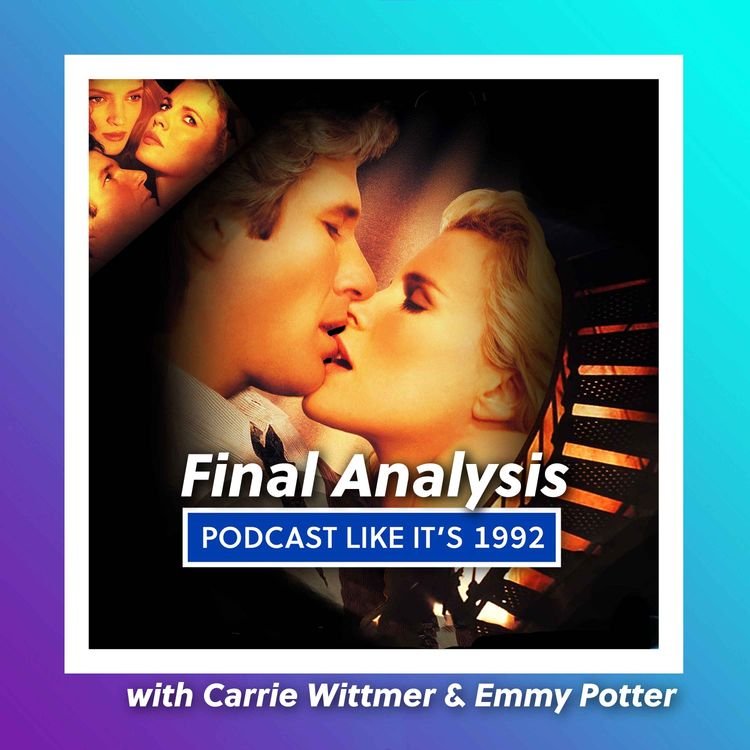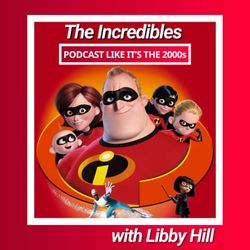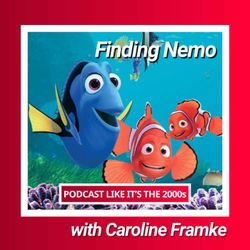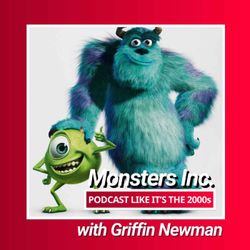Share

Podcast Like It's ...
8: Final Analysis with Carrie Wittmer & Emmy Potter
Season 2
•
Patreon: patreon.com/Podcastlikeits
Twitter: twitter.com/podcastlikeits
Instagram: instagram.com/podcastlikeits
Reddit: reddit.com/r/podcastlikeits
More episodes
View all episodes

77: The Incredibles with Libby Hill
01:38:48|This week on Podcast Like It’s the 2000s, Phil Iscove and Emily St. James continue their Pixar of the 2000s miniseries by diving into Brad Bird’s The Incredibles with critic and writer Libby Hill.Released in 2004, The Incredibles sits at a fascinating crossroads for Pixar part family sitcom, part mid-century spy fantasy, and part superhero deconstruction years before the genre would dominate Hollywood. Phil, Emily, and Libby unpack why the film’s action sequences double as character studies, how its superpowers function as metaphors for family roles, and why the movie still feels sharper than most modern comic-book adaptations. They also discuss the film’s complicated nostalgia, its cultural blind spots, and why The Incredibles managed to “get away with” things that live-action superhero movies still struggle to pull off.Along the way, the conversation touches on Brad Bird’s direction, Pixar’s voice-acting process, the film’s critical and commercial legacy, and where The Incredibles sits in the larger Pixar pantheon especially when compared to its sequel.
76: Finding Nemo with Caroline Framke
01:54:43|This week on Podcast Like It’s the 2000s, Phil and Emily continue their deep dive into Pixar’s 2000s run with Finding Nemo, joined by critic and writer Caroline Framke.Released in 2003, Finding Nemo marked a major turning point for Pixar pairing cutting-edge animation with a surprisingly emotional story about parenthood, fear, and letting go. The group breaks down how revolutionary the film felt at the time, why it still holds up as one of Pixar’s most accessible crowd-pleasers, and how its influence reshaped both animation and merchandising culture in the years that followed.They also dig into Albert Brooks’ anxious Marlin, Ellen DeGeneres’ instantly iconic Dory, the film’s surprisingly existential undertones, and the question of whether Finding Nemo has been culturally overshadowed by later Pixar classics or simply made to look “conventional” by its own success.Along the way, the conversation touches on disability representation, Pixar’s evolving thematic ambitions, and why the ocean remains one of cinema’s most quietly terrifying settings.You can find Caroline Framke at: www.carolineframke.comSupport the show:Get more from Podcast Like It's... on Patreon
75: Monster’s Inc. with Griffin Newman
02:12:01|Phil and Emily head back to early-2000s Pixar with Monsters, Inc., a movie that feels deceptively simple until you realize how much emotional and thematic weight it’s quietly carrying. Joining them is Griffin Newman for a deep dive into why this film has endured as one of Pixar’s most humane, rewatchable achievements.The conversation unpacks the movie’s elegant world-building, its labor-comedy roots, and how it turns corporate systems, energy consumption, and fear itself into something legible for kids without flattening the ideas for adults. They talk Sulley as an unusually gentle Pixar protagonist, Mike Wazowski as both comic engine and emotional fulcrum, and Boo as a character whose impact far outweighs her screen time.They also explore where Monsters, Inc. sits in Pixar’s creative timeline, how its humor is engineered, why its ending lands as hard as it does, and how the film reflects early-2000s anxieties about work, productivity, and empathy. Along the way, the group discusses the studio’s voice-casting philosophy, the film’s visual softness compared to later Pixar titles, and why its central message still plays cleanly more than two decades later.Whether this was your childhood Pixar favorite or one you’ve come to appreciate more as an adult, this episode reframes Monsters, Inc. as a quietly radical movie about fear, care, and choosing connection over efficiency.
74: Sky Captain and the World of Tomorrow with Emma Stefansky
01:23:15|Every year on Podcast Like It’s the 2000s, Phil and Emily pick one Chaos Pick a movie that doesn’t quite fit into any miniseries, but demands to be talked about anyway. This year’s selection is Sky Captain and the World of Tomorrow, the ambitious 2004 pulp-sci-fi experiment that looked like the future of filmmaking… and then quietly disappeared.Joining the conversation is Emma Stefansky, here to passionately defend Kerry Conran’s retro-futurist spectacle starring Jude Law, Gwyneth Paltrow, and Angelina Jolie. The group digs into the film’s groundbreaking all-digital production, its sepia-toned visual language, and why it feels like a volume-stage movie years before volume stages became standard. They also explore how Sky Captain fits into a lineage of stylized adventure films like Dick Tracy and The Rocketeer, and why audiences often remember how the movie looked more than what actually happens in it.Along the way, they discuss Roger Ebert’s glowing four-star review, the film’s middling box office and critical afterlife, the risks of resurrecting actors digitally, and whether Sky Captain is a misunderstood cult object or simply a fascinating near-miss. It’s a conversation about ambition, technology, and the strange movies that briefly convince us we’re looking at the future right before the future changes again.
73: In Bruges with Clay Keller & Alan Sepinwall
01:45:22|We close out our holiday run It’s Christmas and the Boys Are Sad with Martin McDonagh’s In Bruges, a film that balances brutal violence, pitch-black comedy, and unexpected tenderness against a fairy-tale Christmas backdrop. Phil & Emily joined by writers and podcasters Clay Keller and Alan Sepinwall to unpack why this movie has only grown more beloved and more emotionally complicated over time.The conversation dives into Colin Farrell’s career-defining performance, Brendan Gleeson’s quiet moral gravity, and Ralph Fiennes’ volcanic late-movie entrance. They explore McDonagh’s dialogue rhythms, the film’s strange tonal alchemy, and how Bruges itself becomes a purgatorial space beautiful, frozen in time, and quietly judgmental. Christmas lights, medieval towers, and European pageantry all heighten the sense that these characters are stuck between punishment and absolution.They also discuss the movie’s reputation shift from cult hit to modern classic, its placement within McDonagh’s broader body of work, and why In Bruges may be the most emotionally honest entry in the “sad men at Christmas” cinematic canon. Along the way, the group touches on Carter Burwell’s melancholic score, the film’s theatrical release context, and the way humor is used as both shield and confession.Whether you first saw In Bruges in theaters or came to it years later through word of mouth, this episode examines why the film still hits so hard and why it remains one of the defining dark comedies of the 2000s.
72: Catch Me If You Can with Lindsay Ellis
01:19:05|Our holiday miniseries It’s Christmas and the Boys Are Sad continues with Steven Spielberg’s Catch Me If You Can, a movie that feels breezy and charming on the surface and quietly devastating underneath. Phil and Emily are joined by author, video essayist, and YouTuber Lindsay Ellis to unpack why this film has only grown richer with time.The conversation explores the movie’s deceptive simplicity, Leonardo DiCaprio’s performance as a teenager performing adulthood, and Tom Hanks’ unusually vulnerable turn as an FBI agent defined by routine, loneliness, and obsession. They dig into Spielberg’s immaculate craft from match editing to tone control and why the film often gets overlooked in discussions of his “serious” work.They also discuss the film’s Christmas framing, its melancholy view of masculinity and authority, and how its themes of fraud, bureaucracy, and institutional power feel more prescient now than they did in 2002. Along the way, the trio debates the movie’s length, its cultural reception, and why Catch Me If You Can plays like a con movie that slowly reveals itself to be about divorce, abandonment, and the quiet cruelty of systems.Whether you remember it as a slick crowd-pleaser or are revisiting it for the first time, this episode reframes Catch Me If You Can as one of Spielberg’s most emotionally layered films of the 2000s and a perfect fit for a sad-boys Christmas.
71: Kiss Kiss Bang Bang with Alonso Duralde
01:42:17|Our 2000s Holiday Noir miniseries kicks off with a film that helped relaunch Robert Downey Jr.’s career and reintroduced Shane Black to a new generation: Kiss Kiss Bang Bang. Phil and Emily are joined by film critic and historian Alonso Duralde to unpack why this meta-crime-comedy still feels like lightning in a bottle.The trio digs into the movie’s razor-sharp script, its chaotic but affectionate relationship to noir, and the way Shane Black balances darkness with a wink. They explore Michelle Monaghan’s standout performance, Val Kilmer’s iconic turn as Gay Perry, and what made this moment in RDJ’s career so precarious and so thrilling.They also dive into the film’s tone-shifting structure, its overplotted charm, its self-aware narration, and why the movie’s emotional core sneaks up on you. Along the way, they talk Shane Black’s imitators, the difficulty of pulling off postmodern genre homage, and how this film manages to love the very tropes it skewers. Whether Kiss Kiss Bang Bang has been a long-time favorite or a movie you somehow missed, this episode revisits the 2005 cult classic with fresh eyes, big laughs, and a deep appreciation for what makes it so deceptively tricky and so rewatchable.
70: Charlie Wilson’s War with Sonia Saraiya
01:53:46|Our Mike Nichols 2000s miniseries continues with one of the director’s strangest career anomalies: Charlie Wilson’s War. Phil and Emily are joined by critic and writer Sonia Saraiya to unpack how Nichols, Aaron Sorkin, Tom Hanks, and Julia Roberts came together to make a political dramedy that feels breezy on the surface but carries enormous historical weight underneath.The conversation digs into the true story behind the film Charlie Wilson, Joanne Herring, and CIA operative Gust Avrakotos and how their covert efforts armed Afghan fighters during the Soviet Afghan War. Phil breaks down the film’s compressed narrative and its reluctance to grapple with the long-term consequences of U.S. involvement, including the geopolitical chain reaction the movie only gestures toward. Sonia and Emily explore Sorkin’s ideology, the movie’s softened satire, and how the adaptation diverged from the darker, sharper script Nichols originally signed onto.From Philip Seymour Hoffman’s electric performance to Nichols’ complicated, last-years-of-his-career filmmaking context, the episode traces how the movie became both an accessible studio comedy and a missed opportunity for deeper political reckoning. They also examine the infamous alternate ending, Nichols’ battle over the cut, and the creative tug-of-war between Hanks, Sorkin, and the studio.Whether you’ve revisited Charlie Wilson’s War recently or haven’t thought about it since 2007, this episode highlights why the film is entertaining, frustrating, and uniquely revealing about the final chapter of Mike Nichols’ film career.
69: Closer with Sean Fennessey
01:18:49|This week, we continue our Mike Nichols miniseries with a deep dive into Closer (2004), joined by Sean Fennessey of The Big Picture. It’s a film that captivated many of us in our early 20s only to unravel under rewatch with age, perspective, and healthier emotional boundaries.We unpack why Closer once felt like “grown-up cinema,” how its theatrical origins shape its structure, and why its four leads Julia Roberts, Jude Law, Natalie Portman, and Clive Owen are all performing at maximum intensity inside a script that might not deserve them. From the infamous strip-club scene to the messy power dynamics, contradictions, and emotional violence embedded in Patrick Marber’s writing, we ask the question: does any of this actually work?Sean brings insight into Nichols’ career, the film’s mid-2000s cultural footprint (including its unexpected influence on emo/screamo lyrics), and the era’s attempt to manufacture Jude Law into Hollywood’s next megastar. And yes, we talk about Damien Rice, the Oscars, and why Closer remains a fascinating artistic contradiction: a film full of great performances inside a story that collapses under scrutiny.